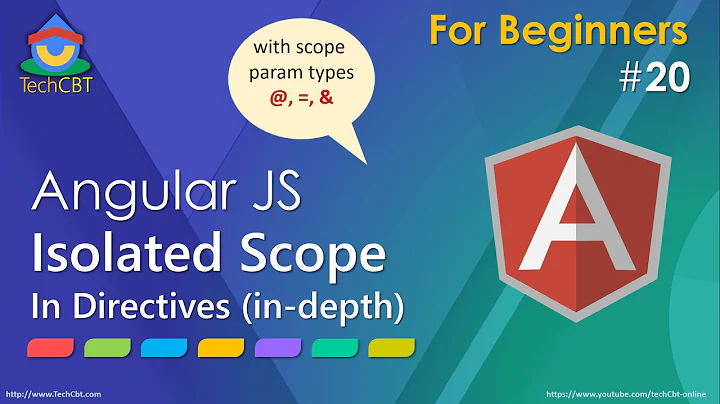How to Unit Test Isolated Scope Directive in AngularJS
Solution 1
See angular element api docs. If you use element.scope() you get the element's scope that you defined in the scope property of your directive. If you use element.isolateScope() you get the entire isolated scope. For example, if your directive looks something like this :
scope : {
myScopeThingy : '='
},
controller : function($scope){
$scope.myIsolatedThingy = 'some value';
}
Then calling element.scope() in your test will return
{ myScopeThingy : 'whatever value this is bound to' }
But if you call element.isolateScope() you'll get
{
myScopeThingy : 'whatever value this is bound to',
myIsolatedThingy : 'some value'
}
This is true as of angular 1.2.2 or 1.2.3, not sure exactly. In previous versions you had only element.scope().
Solution 2
You can do var isolateScope = myDirectiveElement.scope() to get the isolate scope.
You don't really need to test that $watch was called though.. that's more testing angularjs than testing your app. But I guess it's just an example for the question.
Solution 3
move the logic to a separate controller, ie:
//will get your isolate scope
function MyCtrl($scope)
{
//non-DOM manipulating ctrl logic here
}
app.controller(MyCtrl);
function MyDirective()
{
return {
scope : {},
controller: MyCtrl,
link : function (scope, element, attrs)
{
//moved non-DOM manipulating logic to ctrl
}
}
}
app.directive('myDirective', MyDirective);
and test latter as you would any controller - passing the scope object in directly (see Controllers section here for an example).
if you need to trigger $watch in your test do:
describe('MyCtrl test', function ()
{
var $rootScope, $controller, $scope;
beforeEach(function ()
{
inject(function (_$rootScope_, _$controller_)
{
// The injector unwraps the underscores (_) from around the parameter names when matching
$rootScope = _$rootScope_;
$controller = _$controller_;
});
$scope = $rootScope.$new({});
$scope.foo = {x: 1}; //initial scope state as desired
$controller(MyCtrl, {$scope: $scope}); //or by name as 'MyCtrl'
});
it('test scope property altered on $digest', function ()
{
$scope.$digest(); //trigger $watch
expect($scope.foo.x).toEqual(1); //or whatever
});
});
Related videos on Youtube
SavoryBytes
Updated on July 05, 2022Comments
-
SavoryBytes almost 2 years
What is a good way to unit test isolated scope in AngularJS
Directive snippet
scope: {name: '=myGreet'}, link: function (scope, element, attrs) { //show the initial state greet(element, scope[attrs.myGreet]); //listen for changes in the model scope.$watch(attrs.myGreet, function (name) { greet(element, name); }); }I want to ensure the directive is listening for changes - this does not work with an isolated scope:
it('should watch for changes in the model', function () { var elm; //arrange spyOn(scope, '$watch'); //act elm = compile(validHTML)(scope); //assert expect(scope.$watch.callCount).toBe(1); expect(scope.$watch).toHaveBeenCalledWith('name', jasmine.any(Function)); });UPDATE: I got it to work by checking if the expected watchers were added to the child scope, but it's very brittle and probably using the accessors in an undocumented way (aka subject to change without notice!).
//this is super brittle, is there a better way!? elm = compile(validHTML)(scope); expect(elm.scope().$$watchers[0].exp).toBe('name');UPDATE 2: As I mentioned this is brittle! The idea still works but in newer versions of AngularJS the accessor has changed from
scope()toisolateScope()://this is STILL super brittle, is there a better way!? elm = compile(validHTML)(scope); expect(elm.isolateScope().$$watchers[0].exp).toBe('name');-
tusharmath about 10 yearsDid you find a way to setup the spying?
-
SavoryBytes about 10 years@Tushar not really, as before there is a way to get it to work but it's subject to change without notice so use at your own risk.
-
-
SavoryBytes about 11 yearsI'm not sure I agree it's "testing angular" I'm not testing that $watch works but simply that the directive is property "wired-up" to angular.
-
Andrew Joslin almost 11 yearsAlso daniellmb, the way to test this would be to expose your
greetfunction and spy on that, and check if that is called - not the $watch. -
SavoryBytes almost 11 yearsRight, this is a contrived example, but I was interested if there is a clean way to test isolate scope. Breaking encapsulation and putting methods on the scope wouldn't work in this case as there's no hook to add the spy before it's called.
-
SavoryBytes over 10 yearsv1.2.3 feat(jqLite): expose isolateScope() getter similar to scope() github.com/angular/angular.js/commit/…
-
tusharmath about 10 yearsbut where do you spy on the $watch method?
-
 Yair Tavor about 10 yearsyou could expose the function that runs on the $watch and then spy on it. In the directive, set "scope.myfunc = function()...", then in the $watch do "$scope.$watch('myName', scope.myfunc);". Now in the test you can get myFunc from the isolated scope and spy on it.
Yair Tavor about 10 yearsyou could expose the function that runs on the $watch and then spy on it. In the directive, set "scope.myfunc = function()...", then in the $watch do "$scope.$watch('myName', scope.myfunc);". Now in the test you can get myFunc from the isolated scope and spy on it. -
 Danger14 about 10 years@AndyJoslin, Out of curiosity, why create a
Danger14 about 10 years@AndyJoslin, Out of curiosity, why create aisolateScopevariable at all? See Ang's comment on this egghead video (egghead.io/lessons/angularjs-unit-testing-directive-scope): As of Angular 1.2, to retrieve the isolated scope, one needs to useelement.isolateScope()instead ofelement.scope()code.angularjs.org/1.2.0/docs/api/angular.element -
mcv almost 10 yearsDoesn't work for me.
element.isolateScope()returnsundefined. Andelement.scope()returns a scope that doesn't contain all the stuff that I put on my scope. -
taylonr almost 10 yearsWish I had more upvotes to give. You helped me after an hour of scratching my head.
-
Will Keeling almost 10 years@mcv I found I needed to do
element.children().isolateScope() -
user1821052 about 9 years@mcv - are you using templateUrl in your directive? if so you'll need to wrap the isolateScope call in a $timeout to access it. I guess because the $http call for the template load runs after the call to isolateScope (if you don't use the timeout)
-
Matsemann over 8 yearsNeed to call scope.$digest before being able to call element.isolateScope
-
 Arashsoft over 6 yearsWarning:
Arashsoft over 6 yearsWarning:.scope()and.isolateScope()are not available if debugInfoEnabled is false. It means you miss the performance improvement if you want to use these methods. More information: docs.angularjs.org/guide/production#disabling-debug-data






